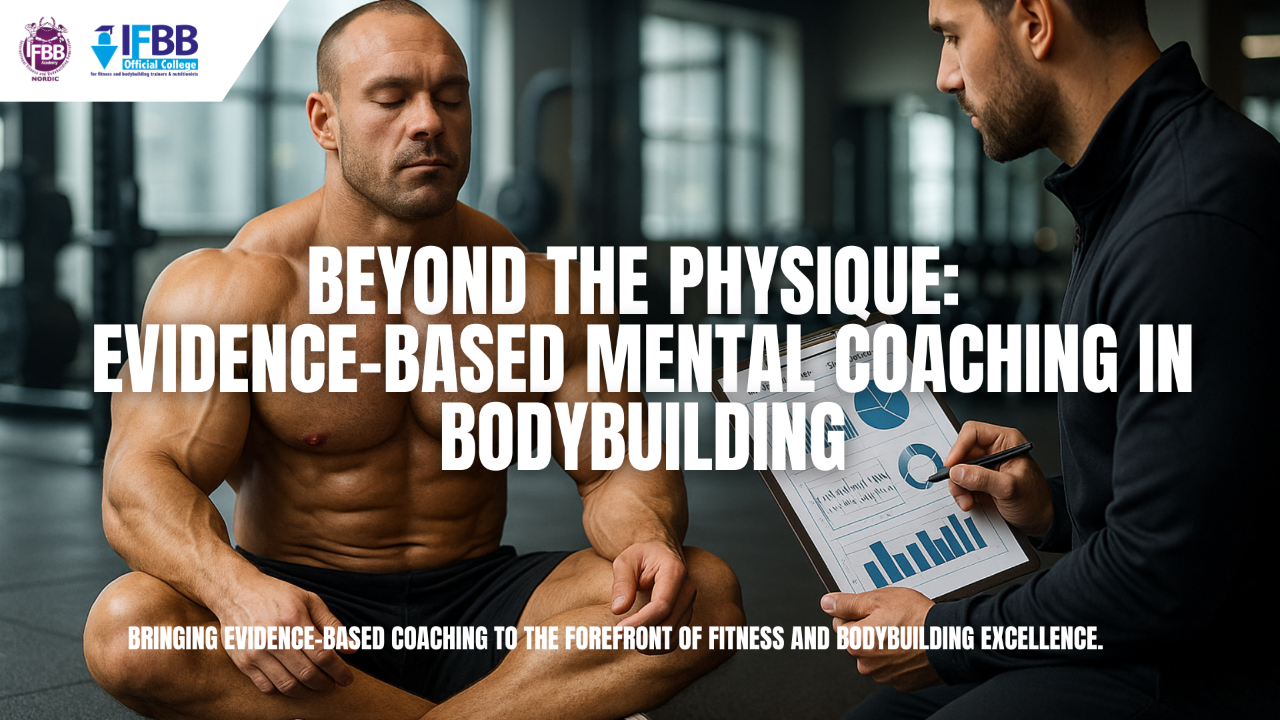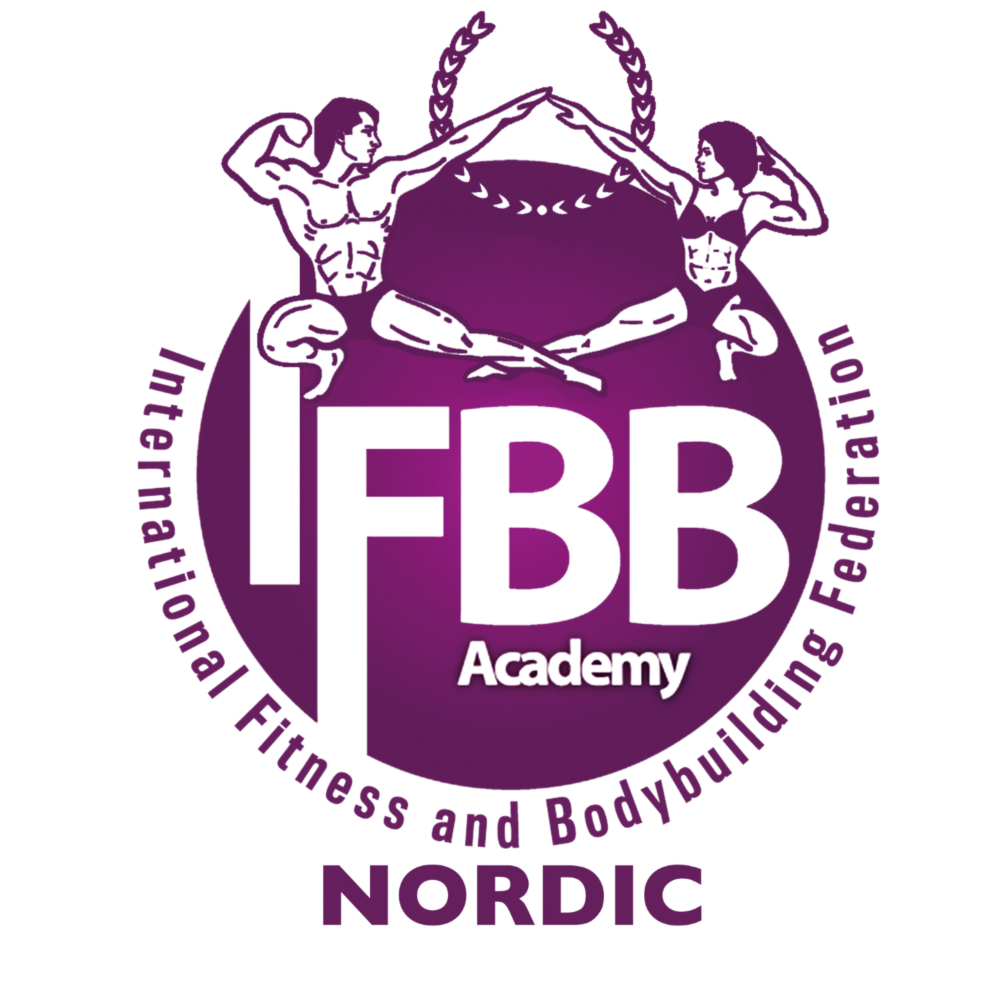Beyond the Physique: Evidence-based Mental Coaching in Bodybuilding
Apr 28, 2025
As a coach, you understand the immense physical dedication bodybuilding demands. You design training programs, guide nutrition, and push athletes to achieve peak physical condition. But truly effective coaching goes deeper. At IFBB Nordic Academy, we champion an evidence-based approach that integrates mental skill development alongside physical training. Understanding the unique psychological landscape of bodybuilding—and your crucial role within it—is key to fostering both high performance and sustainable athlete well-being.
This post expands on concepts from our podcast and social media, offering coaches a deeper look at evidence-based strategies for navigating motivation, stress, body image, and resilience in your athletes.
Igniting Sustainable Drive: Applying Self-Determination Theory (SDT)
Lasting motivation isn't just about willpower; it's about fostering an environment where an athlete's intrinsic drive can flourish. SDT provides a practical roadmap, highlighting three fundamental psychological needs you can nurture:
- Autonomy: Give your athletes a sense of ownership and control.
- How: Engage in collaborative goal setting. Offer meaningful choices in training (exercise selection, order, RPE-based intensity). Use autonomy-supportive language that respects their input. Consider occasional athlete-led sessions. This builds investment and combats psychological fatigue.
- Competence: Help athletes feel effective, capable, and recognize their progress.
- How: Break down long-term goals into achievable milestones. Provide specific, positive feedback focused on effort and process, not just outcomes. Structure training logically and design sessions with opportunities for success. Mastering the "competence-challenge paradox" is vital—push athletes to grow, but calibrate challenges so they feel capable, not overwhelmed.
- Relatedness: Build strong, supportive relationships.
- How: Invest time in genuine rapport—see the person behind the athlete. Foster a supportive team climate where mutual respect prevails. Be accessible and demonstrate you care about their overall welfare. A strong coach-athlete bond significantly impacts motivation and well-being . Acknowledge the social isolation bodybuilding can sometimes entail.
While SDT is foundational, be aware of the powerful "drive for muscularity" inherent in bodybuilding. While necessary, monitor if this drive becomes linked to excessive body dissatisfaction or develops into an obsessive passion that negatively impacts other life areas.
Navigating the Grind: Stress Management and Recovery Programming
The intense training, restrictive diets (especially pre-contest "cutting"), and constant physique focus generate significant stress . You can equip athletes with tools and strategies:
- Teach Proactive Stress Management: Introduce evidence-based techniques like mindful breathing (e.g., Box Breathing), visualization for performance and confidence, positive self-talk/reframing, and Progressive Muscle Relaxation (PMR) (proven effective in reducing competitive anxiety ).
- Prioritize and Program Recovery: Recovery is non-negotiable for adaptation. Emphasize sleep hygiene (aiming for 7-9 hours is crucial) . Integrate active recovery protocols. Ensure nutrition supports repair and energy replenishment. Plan rest days and structured deload weeks (periodization) into their programs to manage fatigue and prevent burnout.
- Recognize Dependence: Be alert to signs of "bodybuilding dependence," where training becomes compulsive and detrimental to health or life balance.
Fostering Confidence: Addressing Body Image in an Aesthetic Sport
Body image is a central, often difficult, aspect of bodybuilding . As a coach, you play a critical role in shaping a healthy environment:
- Acknowledge the Risks: Competitive bodybuilders are at higher risk for Muscle Dysmorphia (MD) symptoms —feeling small despite being muscular—which is linked to anxiety, depression, and low self-esteem . Understand that your relationship quality significantly impacts athlete well-being; perceived support boosts self-esteem, while conflict increases risk for eating issues.
- Shift the Focus: Consistently emphasize function, strength, performance, and effort over pure aesthetics . Help athletes appreciate their body's capabilities.
- Mind Your Language: Avoid "good/bad" food labels and judgmental comments about bodies (including your own) . Model a healthy relationship with food and exercise.
- Promote Acceptance/Neutrality: Encourage athletes to accept their bodies' function without demanding constant positivity.
- Manage Monitoring: Guide athletes on using physique checks (photos, weigh-ins) constructively, perhaps focusing on weekly averages rather than daily fluctuations , to avoid obsessive tendencies.
- Screen and Refer: Given the risks, consider implementing a screening process (potentially with input from dietitians/mental health professionals) to identify at-risk athletes and refer them for specialized support when necessary.
Guiding Through Challenges: Resilience, Setbacks, and Risks
Setbacks are guaranteed. Your role is to help athletes navigate them and build resilience:
- Coach Responses to Setbacks:
- Competition Disappointment: Validate their feelings first. Then, facilitate objective analysis (what worked, what didn't) and collaborative planning. Reframe the experience as feedback for growth.
- Injury: Lead with empathy. Maintain communication, adapt training creatively to focus on what can be done, set realistic rehab goals, and encourage mental skill practice (e.g., visualization) to stay engaged.
- Plateaus: Conduct a thorough assessment of programming, nutrition, and recovery. Implement strategic changes, refocus on process goals, and potentially introduce novel stimuli.
- Recognize High-Risk Periods: Be particularly vigilant with athletes preparing for their first competition ("future competitors"). Research suggests this transition period is critical for the potential emergence of deviant behaviors like extreme dieting, disordered eating, or considering APEDs.
- Address Risks Directly: Discuss the serious health consequences of APED use (cardiovascular, hormonal, psychological) . Help athletes find ways to manage the potential for social isolation inherent in the demanding lifestyle.
- Build Coping Skills: Teach adaptive strategies like acceptance, focusing on controllable factors, and, crucially, self-compassion —encouraging athletes to treat themselves with kindness, especially during difficult times.
The Holistic Imperative: Coaching for Longevity
Effective bodybuilding coaching integrates mind and body. Recognizing the interplay between motivation, stress, body image, and resilience allows you to support athletes more completely. Mental coaching isn't separate from physical preparation; it's an integral part of developing successful, healthy athletes.
This holistic approach includes promoting sustainable practices:
- Flexible Nutrition: Encourage flexible dietary control (e.g., macro/range-based) over extreme rigidity where feasible, potentially improving mental health and adherence.
- Sensible Prep: Advocate for slower, more sustainable rates of fat loss during contest prep (e.g., 0.5-1% body weight/week).
- Planned Transitions: Guide athletes through a structured post-competition recovery phase with a gradual, quantified increase in energy intake, followed by a shift towards more intuitive, internally-cued eating in the deep off-season.
By embracing these evidence-based mental coaching strategies, you empower athletes to not only achieve their physique goals but also to build resilience, confidence, and long-term health in the sport.
Want to hear more discussion and dive deeper into these practical strategies? Listen to our related podcast episode where we expand on these topics.
Ready to take your coaching skills to the elite level? Join the IFBB Master Coach Program and gain the knowledge, techniques, and confidence to coach athletes to success. Don’t miss this chance to learn from world-renowned experts and earn a globally recognized certification! Enroll today and unlock your full potential as a Master Coach.
Stay connected with news and updates!
Join our mailing list to receive the latest news and updates from our team.
Don't worry, your information will not be shared.
We hate SPAM. We will never sell your information, for any reason.
